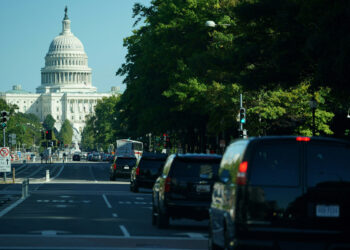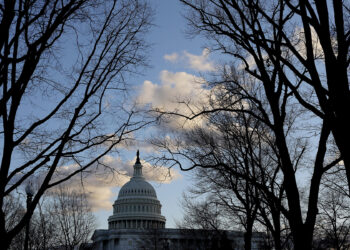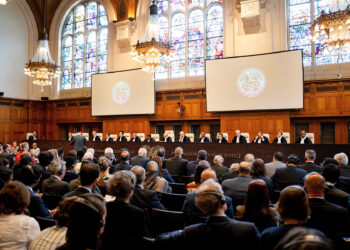Sarah Leah Whitson is the Executive Director of DAWN.
Published in Foreign Policy, December 6, 2021
This week, U.S. Sens. Rand Paul, Bernie Sanders, Ron Wyden, and Mike Lee are expected to push for a vote on a motion disapproving of the Biden White House's first major arms sale to Saudi Arabia—a $650 million deal to export 280 Raytheon-built missiles and 596 missile launchers. The showdown with the White House comes in the same week as an expected Senate vote on an amendment to the National Defense Authorization Act to ban all U.S. support for the Saudi war in Yemen, including this proposed arms sale.
If the democratic will of U.S. citizens mattered, the resolution and amendment would pass easily because the American public has made clear that it opposes arms sales to Saudi Arabia. In a rare display of bipartisan unity, a united House and Senate, Republican and Democrat, recognized this when they voted to ban arms sales and end the U.S. role in the Yemen war not once, but four times in 2019 (the former topic saw three joint resolutions; the latter saw one). They were blocked only by former President Donald Trump's vetoes.
Change seemed on the horizon when then-presidential candidate Joe Biden promised to end arms sales to Saudi Arabia—all arms sales, not just "defensive" ones. This is what the American people want and Congress affirmed in October: to end the United States' complicity in the war destroying Yemen. U.S. weapons and Washington's ongoing support for the Saudi war effort have contributed to an unprecedented humanitarian disaster in Yemen, with millions of Yemenis near starvation and over 130,000 killed, residential areas and factories reduced to rubble, and the economy on the brink of collapse.
The reasons for opposing U.S. arms sales to Saudi Arabia have not changed since 2019. The Kingdom's destabilizing and malign policies, both at home and abroad, continue unabated. Its reckless and indiscriminate attacks on Yemen continue, and civilian casualties continue to mount, with no sensible strategy or prospect for meaningful military or political gains.
Americans should not be fooled by the semantics of "defensive" weapons. The arms sale is a gesture of political support for the Saudi royal family, appeasing the crown prince.
- Sarah Leah Whitson
Ostensibly, Saudi Arabia supports the internationally-recognized government of Yemen's President Abed Rabbo Mansour Hadi, pursuant to U.N. Security Council Resolution 2216, but it in fact long ago gave up the notion that he would return to power, even holding him captive in the Saudi capital, Riyadh.
Instead, the Saudi war in Yemen—supposedly waged to prevent Iranian influence over the Houthi movement—has become a self-fulfilling prophecy, as the Houthis increasingly turned to Iran in the face of the Saudi assault. The United Arab Emirates, meanwhile, has pretended to exit the war, but is still occupying Socotra Island and arming multiple militias, fighting Hadi's internationally recognized (but domestically ignored) government, ensuring no national unity can emerge.
The Saudi siege of Yemen continues as well. Riyadh has effectively closed off the country's sea and air borders, enforcing this siege by relentless bombardment of the airport in Sanaa, Yemen's capital. Indeed, Saudi Crown Prince Mohammed bin Salman appears to be pursuing a policy of collective punishment to starve Yemeni civilians into submission. The consequences, which UNICEF has called the largest humanitarian crisis in the world, have been devastating. New U.S. missiles will only enable Riyadh to maintain this blockade, threatening any aircraft that seeks to land in the country.
Because of the blockade, international journalists and human rights groups have virtually no access to Yemen. There is less accountability and information about what's happening on the ground than ever before. This year, Saudi Arabia usedincentives and threats—such as threatening to block the access of Indonesians to Mecca for the hajj pilgrimage, and bribing Togo with counter-terrorism funding—to encourage large and small countries to vote to end the mandate of the U.N. Security Council's Panel of Experts on Yemen. This ensured that there would be no further documentation of violations of international law, breaches of the Security Council's arms embargo, and the deep corruption of the various parties to the conflict.
Within Saudi Arabia, there has been an unprecedented concentration of power eviscerating any checks and balances on King Salman's and the crown prince's decisions. They have brought the country's traditional power centers—the extended royal family, business community, and religious establishment—to their knees. While the king can still dismiss Mohammed bin Salman as crown prince, no one else can get in his way.
Activists, writers, academics, religious scholars, and journalists—really anyone whom the crown prince perceives may be an independent voice—can be detained or disappeared, tried in kangaroo courts, and subject to long sentences. The country has become a giant prison, with thousands subject to arbitrary travel bans, unable to leave the country without government permission. Saudi authorities have detained, disappeared, or banned at least 89 U.S. citizens, legal permanent residents or visa holders, or their family members in 2021.
The best thing the U.S. government can do for peace and stability in the region is to stop backstopping Mohammed bin Salman's foolish, disastrous war in Yemen.
- Sarah Leah Whitson
Notwithstanding the global outrage over the Saudi state's murder of Jamal Khashoggi, failure to hold Mohammed bin Salman accountable has emboldened him to continue targeting and harassing critics abroad and retaliating against their family members in Saudi Arabia.
One would expect that the Biden administration and the Democratic party, which were so critical of the Trump administration's close relationship to the Saudi royal family, would be pursuing a dramatically different relationship with the sociopathic crown prince. But nothing has substantially changed, even if relations are cosmetically cooler. Instead, the Biden team is repeating Obama-era miscalculations.
The proposed arms sales are not essential when it comes to deterring any real security threats to Saudi Arabia, and they certainly don't uphold any security interests of the
United States. Existing Saudi defenses have already succeeded in intercepting most attempted Houthi missile strikes; and most hit nothing even if not intercepted. If Saudi Arabia wanted missiles from Yemen to stop completely, the safest, wisest, and most economical approach would be for Saudi Arabia to stop bombing Yemen. The Houthis are not interested in conquering Saudi Arabia; their indiscriminate attacks on Saudi Arabia are purely retaliatory.
What's really driving this arms sale is the Biden administration's effort to offer Mohammed bin Salman a sweetener to help him swallow the pending Iran deal, as the Obama administration tried to do by first supporting Riyadh's war in Yemen back in 2015. Yet again, Yemenis are paying with their lives for this "reassurance" of U.S. support. Notwithstanding the whimpers of regret Obama-era officials expressed, post facto, for supporting the war in Yemen, they're at it again under Biden.
There's also a new motivation now for the Biden administration to woo Mohammed bin Salman. Trump son-in-law turned advisor Jared Kushner has passed the baton to U.S. Secretary of State Antony Blinken in the race to get Saudi Arabia to sign the Abraham Accords, bribing the crown prince with bombs just as the Trump administration used illegal favors and dangerous policy changes to woo the UAE, Morocco, and Sudan.
Selling more arms to Saudi Arabia now rewards the country's worst behavior, encouraging the crown prince to reject reasonable negotiations and double down on an unwinnable war—while further entangling the United States in his abuses, destabilizing the region, and inviting terrorist attacks on Americans seen as complicit in crimes against the Yemeni people.
Americans should not be fooled by the semantics of "defensive" weapons. The arms sale is a gesture of political support for the Saudi royal family, appeasing the crown prince despite his efforts to punish Americans by playing games with oil prices.
Biden has refused to talk to the crown prince or grant him immunity from lawsuits—including those of former Saudi official Saad al-Jabri; and of Khashoggi's widow, Hatice Cengiz, and my organization, Democracy for the Arab World Now (DAWN)—which seek to hold Mohammed bin Salman accountable for his crimes.
Members of Congress should not deceive themselves into thinking this weapons deal will help the Saudi people. U.S. policies often confuse support for an unelected tyrant as support for a country. The Saudi people need protection from Mohammed bin Salman; he is responsible for far more harm to the Saudi people than any Houthi missiles. Supporting the crown prince, helping him further consolidate power and unleash repression, is against the interests of the Saudi people. The best thing the U.S. government can do for peace and stability in the region is to stop backstopping Mohammed bin Salman's foolish, disastrous war in Yemen.
There's a reason why U.S. law prohibits arms transfers to systematically abusive foreign governments, such as Saudi Arabia's. The reasoning stems from a recognition that such transfers ultimately harm the United States' national security interests, tethering the country to tyrants and their unchecked powers. It's very clear what the outcome of nearly a decade of U.S. support for the Yemen war is, and what new arms sales to Saudi Arabia will exacerbate: mayhem, suffering, and disaster.







